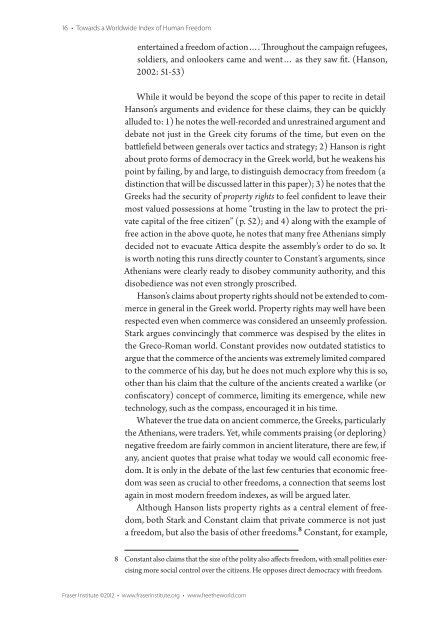Towards a Worldwide Index of Human Freedom
Towards a Worldwide Index of Human Freedom
Towards a Worldwide Index of Human Freedom
You also want an ePaper? Increase the reach of your titles
YUMPU automatically turns print PDFs into web optimized ePapers that Google loves.
16 • <strong>Towards</strong> a <strong>Worldwide</strong> <strong>Index</strong> <strong>of</strong> <strong>Human</strong> <strong>Freedom</strong><br />
entertained a freedom <strong>of</strong> action…. Throughout the campaign refugees,<br />
soldiers, and onlookers came and went… as they saw fit. (Hanson,<br />
2002: 51-53)<br />
While it would be beyond the scope <strong>of</strong> this paper to recite in detail<br />
Hanson’s arguments and evidence for these claims, they can be quickly<br />
alluded to: 1) he notes the well-recorded and unrestrained argument and<br />
debate not just in the Greek city forums <strong>of</strong> the time, but even on the<br />
battlefield between generals over tactics and strategy; 2) Hanson is right<br />
about proto forms <strong>of</strong> democracy in the Greek world, but he weakens his<br />
point by failing, by and large, to distinguish democracy from freedom (a<br />
distinction that will be discussed latter in this paper); 3) he notes that the<br />
Greeks had the security <strong>of</strong> property rights to feel confident to leave their<br />
most valued possessions at home “trusting in the law to protect the private<br />
capital <strong>of</strong> the free citizen” (p. 52); and 4) along with the example <strong>of</strong><br />
free action in the above quote, he notes that many free Athenians simply<br />
decided not to evacuate Attica despite the assembly’s order to do so. It<br />
is worth noting this runs directly counter to Constant’s arguments, since<br />
Athenians were clearly ready to disobey community authority, and this<br />
disobedience was not even strongly proscribed.<br />
Hanson’s claims about property rights should not be extended to commerce<br />
in general in the Greek world. Property rights may well have been<br />
respected even when commerce was considered an unseemly pr<strong>of</strong>ession.<br />
Stark argues convincingly that commerce was despised by the elites in<br />
the Greco-Roman world. Constant provides now outdated statistics to<br />
argue that the commerce <strong>of</strong> the ancients was extremely limited compared<br />
to the commerce <strong>of</strong> his day, but he does not much explore why this is so,<br />
other than his claim that the culture <strong>of</strong> the ancients created a warlike (or<br />
confiscatory) concept <strong>of</strong> commerce, limiting its emergence, while new<br />
technology, such as the compass, encouraged it in his time.<br />
Whatever the true data on ancient commerce, the Greeks, particularly<br />
the Athenians, were traders. Yet, while comments praising (or deploring)<br />
negative freedom are fairly common in ancient literature, there are few, if<br />
any, ancient quotes that praise what today we would call economic freedom.<br />
It is only in the debate <strong>of</strong> the last few centuries that economic freedom<br />
was seen as crucial to other freedoms, a connection that seems lost<br />
again in most modern freedom indexes, as will be argued later.<br />
Although Hanson lists property rights as a central element <strong>of</strong> freedom,<br />
both Stark and Constant claim that private commerce is not just<br />
a freedom, but also the basis <strong>of</strong> other freedoms.8 Constant, for example,<br />
8 Constant also claims that the size <strong>of</strong> the polity also affects freedom, with small polities exercising<br />
more social control over the citizens. He opposes direct democracy with freedom.<br />
Fraser Institute ©2012 • www.fraserinstitute.org • www.freetheworld.com


